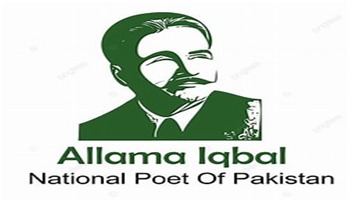A Day of Reflection and Tribute: Bangladesh Celebrates the Legacy of National Poet Allama Iqbal Birth Anniversary with Pride
- On November 9th the day of pride, Bangladesh celebrates the birth anniversary of Allama Iqbal, the esteemed philosopher, poet and great politician who played a role in shaping the ideology of Pakistan. Bangladesh admired the influence of Iqbal’s poetry on Bengali people and culture. Allama Iqbal poetry transcends time and border, reason with people across the subcontinent. Allama Iqbal, a prominent philosopher and poet of the early 20th century, significantly influenced the cultural and intellectual landscape of Bangladesh. His philosophical ideas, rooted in Islamic thought and modernity, resonated deeply with the Bengali intelligentsia. Iqbal’s emphasis on self-discovery and empowerment inspired many to seek a renewed sense of identity amidst colonial subjugation.
This serves as a day of reflection and tribute, allowing Bengali citizens to honor and celebrates the legacy the national poet with pride and respect. Allama Iqbal also the poet of East, the vision of Nationalism in his poetry inspired the independence movement in the Indo-Pak subcontinent. His poetry a sense of profound patriotism, advocating for rights and empowerment of the Muslim community. His poetry not only advocated for political but also called for a deeper introspection into spiritual and moral of individual. In Bangladesh, Allama Iqbal’s birth is marked with various events and activities that homage to his rich literary contributions. Mostly in schools, colleges and universities host seminars and events to introduced Iqbal’s poetry and the legacy. These events encourage younger generation introduced to the profound wisdom and ideology present Allama Iqbal’s poetry fostering a sense of national pride and belonging. Furthermore, Allama Iqbal philosophy creating lasting impact on the cultural and intellectual landscape of Bangladesh. His concept of Khudi promotes the importance of self-realization with excellence and shaped the struggle of Muslims.
Allama-Iqbal philosophy had a profound impact on the cultural and intellectual landscape of Bangladesh. This impact seen in various places and different aspects of Bangladeshi society, including literature, politics and education. They examining Iqbal’s philosophy has permeated Bangladeshi culture, and people of Pakistan also appreciate the lasting legacy he has left on this nation. Allama Iqbal known as the poet of Pakistan but a significant influence on the entire South Asian region, was a visionary philosopher of all time. His poetry and ideas continue to shape the worldviews. Bangladeshi poets and writers have drawn inspiration from Iqbal’s work such as his famous Persian and Urdu poetry collections. The philosophy of self-realization and spiritual awaking the similar themes of self-respect delves into the Bengali culture. His famous Persian and Urdu poetry collection such as ‘Asrar-e-Khudi’ (Secrets of the Self) and ‘Bang-e-Dra’(The call of the Marching Bell) have become iconic works that continue to resonate with readers worldwide.
His poetry articulated themes of nationalism and spiritual awakening, encouraging the Bengali populace to embrace their cultural heritage while also engaging with contemporary global ideas. This duality fostered a unique intellectual environment that blended traditional Islamic values with modernist thought, paving the way for new literary movements in Bangladesh.Iqbal’s vision of a united Muslim identity played a crucial role in shaping political consciousness among Bengalis during the struggle for autonomy. His works continue to be studied not only for their literary merit but also for their profound socio-political implications, solidifying his legacy as an architect of cultural revival in Bangladesh.
Iqbal’s poetry serves as a profound exploration of nationalism and spiritual awakening, specifically tailored for the Bengali populace. Through his verses, he articulates a compelling call to embrace cultural heritage while simultaneously engaging with contemporary global ideas. This duality is crucial in understanding Iqbal’s vision, as it fosters an intellectual environment that harmonizes traditional Islamic values with modernist thought. The interplay between these elements not only revitalizes a sense of identity among Bengalis but also encourages critical engagement with the broader currents of global discourse. Iqbal’s work reflects a nuanced understanding of the complexities inherent in cultural identity, advocating for a synthesis that honors historical roots while embracing progressive ideals. This approach has paved the way for new literary movements in Bangladesh, inspiring writers to explore and articulate their unique experiences through innovative forms.
Ultimately, Iqbal’s vision resonates deeply within the context of Bangladesh’s evolving literary landscape, marking him as a pivotal figure whose contributions continue to influence contemporary thought and artistic expression. Moreover, Iqbal’s influence is evident in the thematic richness and stylistic diversity of current literary works. Writers such as Humayun Ahmed and Taslima Nasrin draw inspiration from Iqbal’s exploration of existential questions and his advocacy for intellectual awakening. This intertextuality dialogue illustrates how Iqbal’s ideas continue to shape narratives that challenge societal norms while fostering a sense of unity among diverse voices in Bangladesh. Iqbal stands as a pivotal figure whose contributions not only enriched early 20th-century literature but also provide a critical framework for understanding contemporary artistic expression in Bangladesh. His vision serves as both a source of inspiration and a catalyst for ongoing dialogues about identity, culture, and the role of literature in societal transformation.
In contemporary discourse, the vision articulated by influential literary figures serves as a profound source of inspiration, catalyzing critical dialogues surrounding identity, culture, and the transformative potential of literature within society. These thinkers challenge conventional narratives, prompting individuals to reflect on their own identities while considering the broader implications of cultural representation. By foregrounding marginalized voices and experiences, they illuminate the complexities inherent in identity formation and cultural exchange. A literature functions as a powerful medium for societal transformation by fostering empathy and understanding among diverse populations. Through narrative exploration, readers engage with perspectives that may differ from their own, thereby cultivating a more nuanced appreciation of cultural dynamics. This engagement not only enriches individual consciousness but also encourages collective discourse on pressing social issues. Great vision of these literary figures inspires ongoing dialogues that question the status quo and advocate for inclusivity in both literature and society at large. Their work exemplifies how literature can act as a catalyst for change, reshaping our understanding of identity and culture in an increasingly interconnected world.




